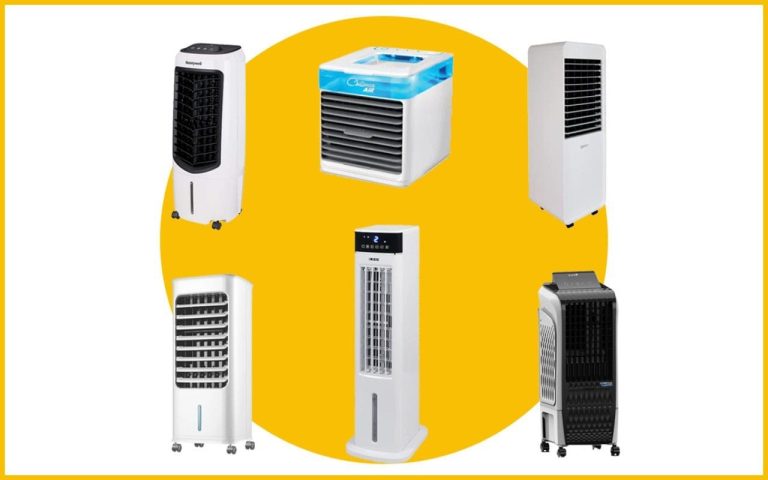What is an air cooler? The simplest way to describe it is halfway between a fan and an air conditioner. A proper air conditioner refrigerates the air by up to 15 degrees. The best air coolers – sometimes called fan coolers – can chill the air by around four degrees, by evaporating water and releasing it as a pleasantly cool mist.
It’s the same kind of cooling that you feel on your skin when you step out of the shower: water draws heat from the environment as it evaporates, chilling the air. For centuries people have hung wet blankets in their doorways to take advantage of the effect. Modern evaporative air coolers simply do it more efficiently, using a honeycomb mesh.
There’s some confusion, understandably. The popular Dyson cooler, for example, is not actually an air cooler, nor an air conditioner, but a fan. Big names like Mylek and ProBreeze all make air cons, fans and air coolers. So it’s important to know what you’re getting – and why.
“Air coolers perform better than a standard fan, and unlike a portable air conditioner, they do not require any venting outside,” says the AirConCentre’s Nick Kandola, an expert buyer with fifteen years’ experience in air conditioning. “The market has grown steadily as people look for more energy-efficient and cost-effective ways to keep cool during the summer”.
AirConDirect’s Victor Stoica, another longstanding aircon expert, adds that they’re more environmentally friendly than refrigerant units, since they don’t use harmful chemicals. “Also, unlike air conditioners, they’re suitable for outdoor spaces like garages, workshops and patios,” he says. “They create spot cooling, dropping the air temperature by a few degrees.”
Air coolers are much cheaper to run* than portable air conditioners, averaging 2-4p compared to 20-40p per hour. They’re also much lighter, averaging around 6-7kg rather than 20-30kg, and require no complicated set-up – although it’s wise to leave a door or window open to avoid too much humidity building up in the room, reducing their effectiveness. The question is, can they compete when a heatwave strikes?
I’ve tried this year’s best portable air coolers and you can read my full reviews below, followed by expert answers to some frequently asked questions. But if you’re in a hurry, here’s a quick look at my top five:
Which are the best air coolers in 2024? At a glance
How to choose the best air cooler for you
“Firstly, you’ll want to consider the size of the room,” says the AirCon Centre’s Kandola. “A high-quality air cooler should be able to cool a 12-15m2 room quickly and efficiently without making too much noise.” Some cheaper air coolers work better at close range – by the side of the bed, for example.
“Additionally, it should be easy to use and maintain, with features like air cleaning filters, automatic shutoff and timers. You’ll also want to make sure it’s energy-efficient. The more powerful units use more energy, although all air coolers are much cheaper to run than air conditioners.”
